Six Ways Oxfam Goes Beyond Charity to End Inequality, Poverty and Injustice
At Oxfam, we know charity isn't enough.
Delivering food and essential supplies is critical and indeed lifesaving. But we know that to end poverty and injustice, we must tackle their complex root causes.
We also know that transformative change comes from understanding power and putting it in people's hands.
We work alongside community partners in cities, towns, and villages worldwide. With the support of our compassionate supporters, we strive to change attitudes, norms, and behaviours and influence the policies that affect people's lives.
How Does Oxfam Go Beyond Charity?
1. Tackling COVID-19 with a Community Approach
“Forty thousand people per square kilometer,” says Oxfam’s Enamul Hoque. “That’s twice the population density of Dhaka. You can’t imagine how crowded the camps are.” Hoque is Oxfam's coordinator for water, sanitation, and hygiene (WASH) in the Rohingya refugee camps in Cox's Bazar, Bangladesh.
When thousands of refugees, fleeing unspeakable violence, arrived from Myanmar in 2017, he helped establish water tanks and taps, handwashing stations, latrines, and a fecal sludge processing plant.
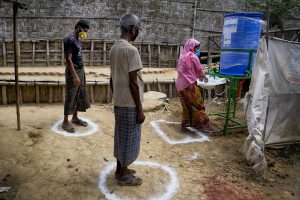
Refugees use contactless handwashing devices in Rohingya camps in Bangladesh to prevent the spread of COVID-19. Photo: Fabeha Monir / Oxfam.
Though effective against diarrheal disease, existing handwashing facilities could be contagion vectors for the COVID-19 virus. So Hoque and his team set out to create a safer design.
Oxfam uses "social architecture" to design water and sanitation facilities, meaning local communities are part of the design process.
"We installed a prototype of the handwashing station and then interviewed dozens of people after they used it," says Hoque. "Based on what they told us, we altered the design." Foot pedals replaced hand-cranked water fixtures.
Hoque is especially interested in what women and girls have to say "because they have so many responsibilities related to water and keeping their families clean." Girls suggested installing features in handwashing stations such as hooks to hang things and mirrors.
"It's important that a handwashing station be something you like to use," says Hoque. "We invited girls to think like architects and design something that would benefit them and their families. This process helped them take charge of a piece of their lives."
2. Changing Laws to End Violence Against Women and Girls
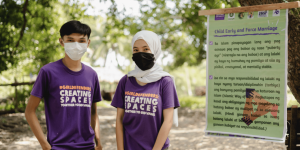
Youth leaders, Juanday Esmael and Farhana Ganoy, teach young people in their community about the impacts of child, early, and forced marriage in Guindulungan, Maguindanao, Philippines. Photo: Princess Taroza/Oxfam
Central to our Creating Spaces project is its support to movements demanding laws and legislation that protect women and girls from violence and early marriage. It also champions survivor-centred services, economic empowerment for women and girls, and movement building alongside influencers and local partners.
For instance, in Indonesia, Creating Spaces and its implementing partners were pivotal in ratifying the country's marriage law, which raised the minimum age of marriage for girls from 16 to 19. And, in the Philippines, thanks to the tenacity of the Creating Spaces team and its allies — like the youth-led #GirlDefenders — the Girls Not Brides Act, outlawing marriage below the age of 19, has been approved by the Senate and the House. It will soon be presented to the President for approval.
3. Securing the Rights of Domestic and Garment Workers
Women and girls from Bangladesh's rural and coastal areas, pushed by factors like poverty, dowry, divorce, climate change, and family debts, move to cities seeking work and a better life.
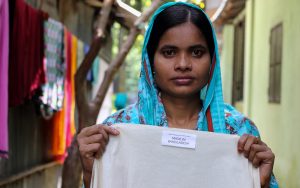
The Bangladeshi women who make our clothes work their entire lives to earn what top fashion CEOs make in just four days. Photo: Fabeha Monir/Oxfam
However, they find few employment options, such as domestic work or garment factory work, which deny them decent working conditions, living wages, and legal protections.
We've been supporting women domestic workers to fight for their rights through our Securing Rights project. Last year, it created more than 200 domestic workers' groups, where women learn about advocacy for labour rights. Also, over a thousand women in Dhaka, the country's capital, received technical training to use an app that helps them secure employment with fairer pay and better working conditions.
On the other hand, Canadian fashion brands keep the Bangladeshi women who make our clothes in poverty by paying as little as 60 Canadian cents an hour. We're mobilizing supporters to hold Canadian brands accountable through our What She Makes campaign.
4. Advocating for Climate Justice
One of the most unjust aspects of climate change is that it impacts those countries that are the least responsible for creating it. That's why Oxfam Canada's experts press for solutions crafted by the people and communities most affected by the climate crisis.
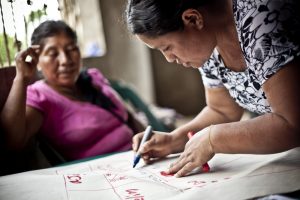
Camino Verde project participants brainstorm together during a leadership workshop. Photo: Pablo Tosco/Oxfam
A key priority is advocating for the Canadian government to meet its global climate financing commitments. Climate finance can be used to support farmers' transition to drought-resistant crops, establish early warning systems in communities prone to typhoons or cyclones, or install renewable energy sources so children can study and women can start businesses. It's critical to help vulnerable communities deal with the impacts of a crisis that they did little to create.
With projects like Camino Verde — The Green Way — we support Indigenous women and youth in Guatemala to start socially and environmentally responsible small businesses. Working with five local partner organizations, we supply them with solar panels, commercial roasters, water collection equipment and greenhouses. Camino Verde also works with women's rights and other groups to influence policies and programs that support economic empowerment, human rights and climate justice for Indigenous women.
5. Creating a World Where Her Future is Her Choice
Globally, complications during pregnancy and childbirth are the second cause of death for girls aged 15 to 19. We support organizations to provide essential sexual and reproductive health services and advocate for changes in policy and social norms that women and girls to make decisions about their bodies.
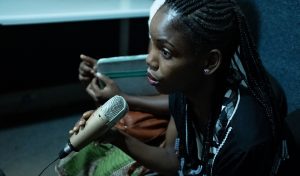
Working with our local partner, NAFEZA, in Mocuba, Mozambique, Gilda Jacinto speaks out on the importance of SRHR at a local radio station. She taps into her personal experience as a young mother in her activism. Photo: Caroline Leal/Oxfam
Our Sexual Health and Empowerment (SHE) project in the Philippines reaches people in Indigenous communities, conflict-affected, disaster-prone and rural areas. Through mobile clinics, women and girls receive dignity kits to support menstrual hygiene and family planning services. The project mentors local women's rights organizations to promote sexual and reproductive health and rights.
Our Her Future Her Choice project in Ethiopia, Malawi, Mozambique and Zambia trains young people to be peer educators in their schools and youth clubs to raise awareness about sexual and reproductive health and rights. For example, one of our partners in Ethiopia, WE-Action, purchased airtime from local radio stations to broadcast weekly one-hour sexual and reproductive health and rights programs and COVID-19 safety measures in local languages.
6. Supporting Humanitarian Action with Cash
Sometimes, when people are in crisis, the best support we can offer is financial. Emergency cash vouchers have the most impact on community members made vulnerable by environmental disasters, displaced by conflict and war, or experiencing gender-based violence.
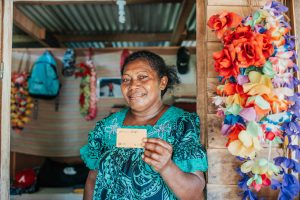
Ananeth Garae used her e-voucher card to purchase materials to repair her severely damaged home after tropical cyclone Harold hit Vanuatu in early 2020. Photo: Arlene Bax/Oxfam
These vouchers place power and decision-making into people's own hands. They're also solid assets in disaster preparedness, as seen with Oxfam's Typhoon Rai response in the Philippines. Through digital cash transfers, humanitarian groups quickly and effectively distributed funds to over 2,500 families in the Philippines before Typhoon Rai hit.
Oxfam Pilipinas Country Director, Maria Rosario Felizco, explains that communities can recover much sooner by shifting how and when aid organizations deliver cash aid.
"To strengthen Filipinos' disaster resilience, we need to move from a post-disaster response mechanism," Felizco says. "Instead, we must anticipate disasters and support vulnerable groups such as low-income families, elderly people, single women with children, and people with disabilities."
When you support our Emergency Response Fund, you enable Oxfam to quickly and effectively respond to humanitarian crises even before they hit.
As you can see, at Oxfam, we don't just do charity.
We root our actions in community, advocacy and justice. Support our life-changing work.

